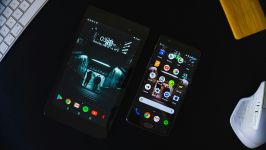Google Glass — the media giant's hot, wearable computer — may be the next big tech product, but it is also raising questions about privacy. The fact that a Google Glass wearer can record and broadcast you in public without your even knowing it is making some folks wonder how this new product will affect our right to privacy.
With the moves from PCs to laptops to smartphones, the race is speeding up exponentially toward the final destination (let's be honest: computers in your brain), and Google Glass represents perhaps the most giant leap yet.
It's for this reason that The Guardian — along with many other media/tech analysts — sees the Google Glass as soon becoming "pervasive" upon its release in the coming holiday season.
Worries about the Google Glass possibly causing cancer (a la similar worries about cellphones) may be questionable. But the fact that anyone wearing a pair of the Google Glasses can video-record you and have it up on the 'Net before you can say, "Wait, what's that...?" is a very real here-and-now danger we may all have to contend with before the year is up.
The ease with which the Google Glass can take a picture or video of you (whether you are aware of it or not) is as simple as saying, "OK Glass, record a video" or "OK Glass, take a picture," as shown in the various demo videos that Google co-founder Sergey Brin has been promoting.
"The only other way to get that point of view is to strap a camera to your head," The Guardian says.
Because Google has already released "volunteers" to try out the Google Glass in the real world, it's possible that you've already been Google Glassed without being aware of it.
"There is a kid wearing Google Glasses at this restaurant which, until just now, used to be my favorite spot," Editorially's David Yee tweeted as early as Saturday, Feb. 23 (which is interesting, as the Google Glass Explorers program didn't close its deadline until Friday, Feb. 27).
The question of privacy with Google Glass use will be more salient as the item becomes not only wanted but flaunted. It's the product everyone's pining for, meaning soon a lot of us (slash them) will have one.
Anticipated desire for the Google Glass is so rampant that there's a story of a now infamous eBay auction in which a person offered a pair for an exorbitant $16,000 (more than ten times Google's asking price). The auction was shut down as suspicious, considering the person didn't yet possess the item for sale.
"Glass has amassed almost 13B impressions and over 1.3M mentions on Twitter over the last year, with almost 50% during the last month alone," reports Nicky Budd-Thanos of NetBase, which analyzes social media analysis and intelligence. "Additionally, the sentiment is overwhelmingly positive (by a 5:1 ratio). And while Google is not disclosing the number of entrants to be an Explorer, there were over 145K mentions of the #ifIHadGlass hashtag (which is how Google tracks their potential explorers)."
What will be particularly intriguing is the fact that not everyone will even know what the Google Glass is when they're seeing it. This means your privacy could be violated by something you don't even understand.
Take the story of early Google Glass "volunteer" Joshua Topolsky who reviewed the product for The Verge recently. He somewhat sardonically notes in his article that although the conspicuous camera crew he brought along was asked to vacate the Starbucks they entered together, Topolsky's Google Glass allowed him to remain and videotape his entire coffee order, totally under the radar.
"Yes, you can see a light in the prism when the device is recording, but I got the impression that most people had no idea what they were looking at," Topolsky says. "The cashier seemed to be on the verge of asking me what I was wearing on my face, but the question never came. He certainly never asked me to stop filming.
"Once those Explorer editions are out in the world, you can expect a slew of use (and misuse) in this department," Topolsky continues.
"The idea that you could inadvertently become part of somebody else's data collection — that could be quite alarming," says Oliver Stokes, principal design innovator at PDD, which helps clients such as LG, Vodafone and Fujitsu design products. "And Google has become the company which knows where you are and what you're looking for. Now it's going to be able to compute what it is you're looking at."
If the idea of Google Glass being able to film you without your knowing it (or even knowing who's filming you) isn't scary, just imagine what will happen with the FBI — which has been using the Patriot Act to commandeer data from Google for at least the last four years — doing whatever it wants with the recording.
Like what you're reading? Follow @profklickberg.









